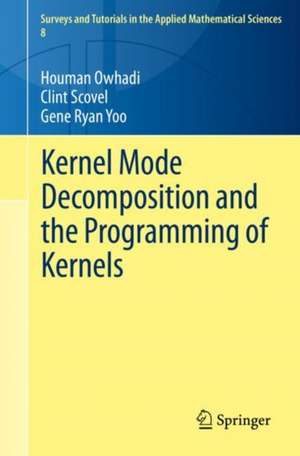Kernel Mode Decomposition and the Programming of Kernels: Surveys and Tutorials in the Applied Mathematical Sciences, cartea 8
Autor Houman Owhadi, Clint Scovel, Gene Ryan Yooen Limba Engleză Paperback – 4 dec 2021
Although kernel methods have strong theoretical foundations, they require the prior selection of a good kernel. While the usual approach to this kernel selection problem is hyperparameter tuning, the objective of this monograph is to present an alternative (programming) approach to the kernel selection problem while using mode decomposition as a prototypical pattern recognition problem. In this approach, kernels are programmed for the task at hand through the programming of interpretable regression networks in the contextof additive Gaussian processes.
It is suitable for engineers, computer scientists, mathematicians, and students in these fields working on kernel methods, pattern recognition, and mode decomposition problems.
Preț: 481.19 lei
Preț vechi: 566.11 lei
-15% Nou
Puncte Express: 722
Preț estimativ în valută:
92.10€ • 95.73$ • 76.29£
92.10€ • 95.73$ • 76.29£
Carte tipărită la comandă
Livrare economică 04-18 februarie 25
Preluare comenzi: 021 569.72.76
Specificații
ISBN-13: 9783030821708
ISBN-10: 3030821706
Pagini: 118
Ilustrații: X, 118 p. 41 illus., 31 illus. in color.
Dimensiuni: 155 x 235 mm
Greutate: 0.19 kg
Ediția:1st ed. 2021
Editura: Springer International Publishing
Colecția Springer
Seria Surveys and Tutorials in the Applied Mathematical Sciences
Locul publicării:Cham, Switzerland
ISBN-10: 3030821706
Pagini: 118
Ilustrații: X, 118 p. 41 illus., 31 illus. in color.
Dimensiuni: 155 x 235 mm
Greutate: 0.19 kg
Ediția:1st ed. 2021
Editura: Springer International Publishing
Colecția Springer
Seria Surveys and Tutorials in the Applied Mathematical Sciences
Locul publicării:Cham, Switzerland
Cuprins
Introduction.- Review.- The mode decomposition problem.- Kernel mode decomposition networks (KMDNets).- Additional programming modules and squeezing.- Non-trigonometric waveform and iterated KMD.- Unknown base waveforms.- Crossing frequencies, vanishing modes, and noise.- Appendix.
Textul de pe ultima copertă
This monograph demonstrates a new approach to the classical mode decomposition problem through nonlinear regression models, which achieve near-machine precision in the recovery of the modes. The presentation includes a review of generalized additive models, additive kernels/Gaussian processes, generalized Tikhonov regularization, empirical mode decomposition, and Synchrosqueezing, which are all related to and generalizable under the proposed framework.
Although kernel methods have strong theoretical foundations, they require the prior selection of a good kernel. While the usual approach to this kernel selection problem is hyperparameter tuning, the objective of this monograph is to present an alternative (programming) approach to the kernel selection problem while using mode decomposition as a prototypical pattern recognition problem. In this approach, kernels are programmed for the task at hand through the programming of interpretable regression networks in the contextof additive Gaussian processes.
It is suitable for engineers, computer scientists, mathematicians, and students in these fields working on kernel methods, pattern recognition, and mode decomposition problems.
Although kernel methods have strong theoretical foundations, they require the prior selection of a good kernel. While the usual approach to this kernel selection problem is hyperparameter tuning, the objective of this monograph is to present an alternative (programming) approach to the kernel selection problem while using mode decomposition as a prototypical pattern recognition problem. In this approach, kernels are programmed for the task at hand through the programming of interpretable regression networks in the contextof additive Gaussian processes.
It is suitable for engineers, computer scientists, mathematicians, and students in these fields working on kernel methods, pattern recognition, and mode decomposition problems.
Caracteristici
Introduces programmable and interpretable regression networks for pattern recognition Uses the classical mode decomposition problem to precisely illustrate models Demonstrates a program for representing nonlinearities through hierarchies










